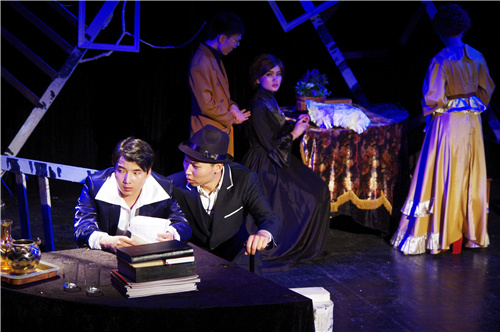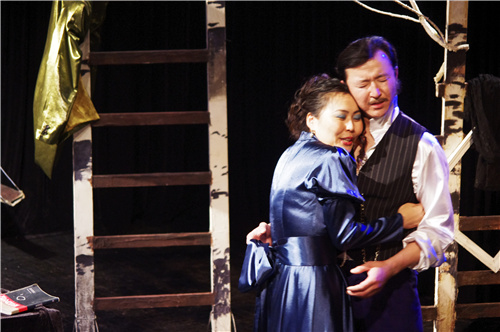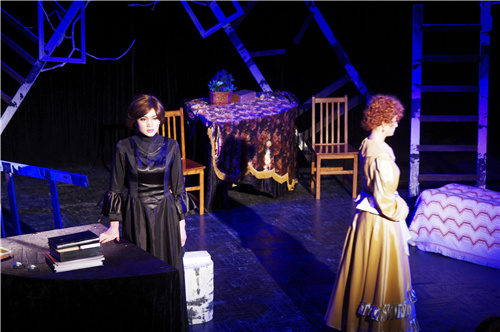
Director: N. Gankhuyag
Playwright: Anton Chekhov
Institution: Mongolian State University of Arts and Culture
Venue: Black Box Theatre
Time: 16:00, May 20, 2012
Event: The 2nd Asian Theatre Schools Festival

Director’s Notes
Our academy has rehearsed all Chekhov's dramatic works. The play that we especially present for the 2nd Asian Theatre Schools Festival is Chekhov's The Seagulls.
Chekhov is good at mining inner theatre factors hidden deeply in life or in the "undercurrents" of life of the characters. The mobility of Chekhov's drama is mostly expressed in the inner development, which is richer, more powerful and passionate than external development and it connect small things that feature daily, accidental and local to form a theme dominating the audience' mind. The external mobility and the internal mobility of the script seem unrelated to each other and are not consistent. People are depressed completely by the vulgar environment, while the real story hides in the corner of secret. Sea Gull's lyrical artistic theme is also the true inner theme below the undercurrents of the real life.
We are very glad to revive this great work again. Calling for love - is a life lesson in the ruthless and loveless society where people all pursuit self-interest. With a better understanding of the play the students have a good opportunity to show their talent, and this is also a very good learning practice for them.

Synopsis
The road that Treplieff is walking is a decadent socialist road away from the real life. While with some talents and willingness to make innovation in art, his parochial existence makes him far away from the people and the social reality, thus he fails to find the source of art. His cowardly personality makes him give in to the pressure of the urban petty bourgeois' vulgar life and lose the courage to move ahead, as if he is a seagull whose wings are broken. He is often immersed in pain and there is nothing in the world for him to yearn, this anguished depressive emotion leads him to the decadent art road eventually. In face of the dual failure of art and love, he makes a choice to suicide as an end. The lack of "central idea" is the underlying reason for his destruction; he just cannot withstand a single blow.
The art road Nina chooses is different from that of Treplieff, thus causing their fates are not the same. Nina is a kind and beautiful girl with an enthusiastic and lively personality, constantly pursuing the ideal. On the road to art, love has brought her a lot of trouble and pain. Between Treplieff and her, there was once a warm and pure love. Then she understands this young lover is so far from the reality and too fragile to be helpful for her art pursuit, so she leaves him and chooses the already famous writer Trigorin. Her second love is out of the" respect for the genius". She chooses Trigorin resolutely because she worships his genius and fancies that the writer can guide and help her in art business. But unfortunately Trigorin is not as noble as he looks like, and for him the love between he and Nina is just an act, an accidental amusement. He soon abandons her and goes back to Abkadina. So, Nina's sweet dream for love shatters quickly and then her beloved baby dies unfortunately. A series of terrible blows fall on her heavily.
However, strong willed Nina is not collapsed under pressure. She is not an overwhelmed seagull and she faces the austere reality life bravely, withstanding the test of life again and again. In the hard life of pursuing art, she matures gradually and her faith become more firm, and she grows from a dreamy girl to a "real actress" with indomitable heart. Nina is neither a dead gull shot by Treplieff nor an overwhelmed seagull destroyed by a man who lay about all day in the short story conceived by Trigorin. Nina is a seagull spreading her wings to fly up in the sky. She overcomes any hindrance, and flies bravely in the broad open sky of art.

